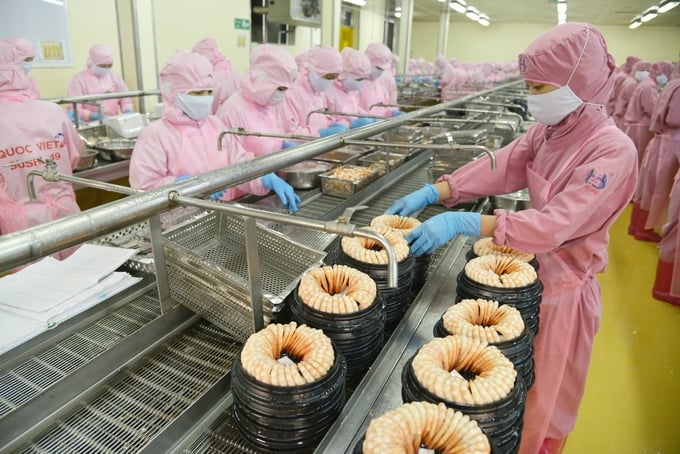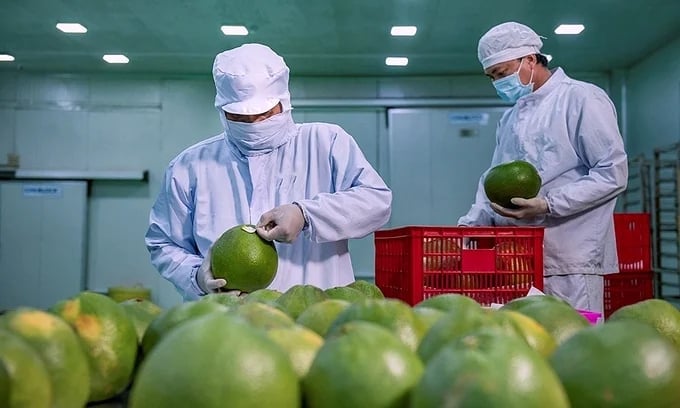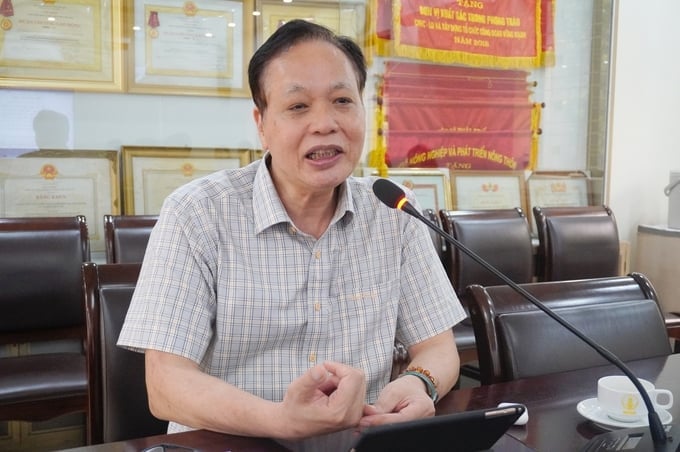May 18, 2025 | 17:56 GMT +7
May 18, 2025 | 17:56 GMT +7
Hotline: 0913.378.918
May 18, 2025 | 17:56 GMT +7
Hotline: 0913.378.918
The National Authority for Agro - Forestry - Fishery Quality, Processing and Market Development (NAFIQPM) held its first meeting of the Negotiation, Market Access, and Market Development Team under the Steering Committee for Food Safety, Quality, and Market Development on May 23, in Hanoi city.
Mr. Nguyen Nhu Tiep, General Director of NAFIQPM, and Head of the Negotiation, Market Access, and Market Development Team, chaired the meeting.
Members of the Working Group established under the Ministry's Decision No. 1064/QD-BNN-CCPT, dated April 12, 2024, were present at the meeting.

Thirteen countries and territories worldwide are currently advocating for the establishment of an official list for seafood export processing facilities.
During the meeting, Pham Thi Lam Phuong, a representative of the Agency of Foreign Trade under the Ministry of Industry and Trade, reported that Vietnam's agricultural, forestry and fishery export turnover reached 12.25 billion USD in the first three months of 2024; marking an increase of 26.8% compared to the corresponding period in 2023, accounting for approximately 13.2% of the country's total export turnover.
Vietnam's current agricultural, forestry and fishery exports to international markets are facing considerable challenges. Notably, Vietnam's key export markets such as the United States, EU, and the UK, are experiencing rising unemployment rates; macroeconomic instability; and reduced import demand due to high inflation rates.
There is a growing concern among consumers in these markets regarding not only the origin and quality of food products but also the methods of production and how companies treat their employees, the environment, and society.
Regional and global geopolitical tensions continue to escalate in unpredictable patterns, resulting in steep price increases for imported raw materials.
Vietnam's exported agricultural products mainly consist of frozen goods and semi-processed or raw materials, with limited high-value processed products. In 2017, Vietnam received a "yellow card" on IUU fishing from the European Commission for fishery exports to the EU.
"Competition among export markets may rapidly increase as more countries express interest in signing and joining FTAs such as the ASEAN-Canada Free Trade Agreement, launched in August 2022, which offers advantages to suppliers such as Indonesia and the Philippines. Furthermore, several economies have indicated interest in joining the CPTPP Agreement," Phuong emphasized.
Nguyen Quang Hieu, Deputy Director of the Department of Plant Protection under the Ministry of Agriculture and Rural Development, highlighted the challenges of exporting Vietnamese pomelo to the Japanese market during the meeting.
According to Deputy Director Hieu, the Department of Plant Protection will continue to actively engage in negotiation and market expansion efforts.
Regarding the Chinese market, the Department of Plant Protection will prioritize negotiations to gain market access for fresh coconut and frozen durian products. Furthermore, the Department will continue to finalize the draft Protocol for the export of jackfruit.
Jackfruit is a traditional commodity in official exports; however, it must follow the standardized protocol agreed upon with Chinese Customs. Following jackfruit, Vietnam's focus will shift to longan, lychee, and rambutan.
On the other hand, China has submitted a draft Protocol for medicinal herb products. The Department of Plant Protection is currently reviewing and collecting feedback from relevant parties to facilitate the signing of this Protocol. However, the unique nature this product present numerous challenges involving other stakeholders.
Regarding the US market, Vietnamese passion fruit products will gain market access following coconut. However, at present, the Department of Plant Protection is proposing US authorities to explore additional treatment measures, based on those recognized by other countries, including: cold treatment for Vietnamese lychee exports to the US; hot water treatment for mangoes and dragon fruit; and Methyl Bromide treatment for lychees.
"Vietnamese pomelo exports to the Japanese market face the most significant challenge because Japan requires exporting countries to conduct an independent verification test, without reusing verification results from other countries. This test consists of four stages that span nearly 1 year. As a result, it will require more time, and it is unlikely to be completed within this year," emphasized Deputy Director Hieu.

Vietnamese pomelo faces significant challenge in gaining access to the Japanese market. Notably, Japan requires exporting countries to conduct an independent verification test, without reusing verification results from other countries.
Additionally, Deputy Director Hieu highlighted several challenges in Vietnam's effort to negotiate and expand the market for select agricultural products, including: frequent and increasingly strict changes in plant inspection regulations from various countries; a tendency for countries to apply various non-tariff measures to agricultural products.
The lengthy and resource-intensive pest risk assessment process, coupled with the lack of a large-scale concentrated production area meeting export standards, poses as a substantial obstacle.
Producers and export businesses possess limited understanding, and often underestimate the importance of complying with the requirements imposed by importing countries.
Notably, Deputy Director Hieu emphasized concerns regarding "products with potential for future export", as well as businesses' capacity to meet import requirements.
Regarding the expansion of fishery exports to countries with high import demand, Deputy Head of the Food Safety Department at NAFIQPM Dang Van Vinh, reported that as of present, 25 countries and territories worldwide require assessment and certification of food safety for fishery exports; 13 countries and territories advocate for the establishment of an official list for seafood export processing facilities.
Deputy Head Vinh also highlighted several challenges faced by Vietnamese fishery exports in major importing markets. Namely, only processing facilities included in the EU's recognized list are allowed for export.
The EU imposes strict requirements regarding certification and chain control on its imported products; and specifies that domestically salted tuna products can only be used within the canned food industry.
Regarding the Brazilian market, regulations stipulate that only phosphates as additives outside the layer of ice are allowed for fishery products (including fish and shrimp).

NAFIQPM Director Nguyen Nhu Tiep: "Vietnam's agricultural export turnover has reached over 53 billion USD; however, this figure is relatively low compared to the country's potential advantages." Photo: Hong Tham.
There are no special requirements regarding heat treatment for each shrimp disease; there are only generalized heat treatment requirements for each type of product.
Regarding the Saudi Arabian market, Saudi Arabia is currently imposing a temporary suspension order on all Vietnamese aquaculture products.
NAFIQPM Director Nguyen Nhu Tiep stated that despite significant efforts, Vietnam is unable to gain access to additional markets around the world. Vietnam's agricultural export turnover has reached over 53 billion USD; however, this figure is relatively low compared to the country's potential advantages.
"Some of the markets discussed here are recurring challenges," Director Tiep emphasized, highlighting that negotiations and market access in regions such as Japan and the Middle East continue to face significant difficulties.
According to Director Tiep, Vietnam must prioritize the development of potential markets, niche markets, and the domestic market in addition to major and traditional markets.
Furthermore, NAFIQPM will develop a draft document outlining specific tasks regarding agricultural, forestry and fishery products. for each member of the Negotiation, Market Access, and Market Development Team. Notably, the document will emphasize the strengths of each member according to their functions and responsibilities.
Long-term efforts will be directed towards building comprehensive market information data, with a focus on market capacity, market demand, and consumer preferences.
In addition, there will be an emphasis on strengthening communication and promotion activities to enhance the reputation of Vietnamese agricultural, forestry and fishery products.
Furthermore, close coordination between the Agriculture and Trade sectors is essential to promote trade. A Project is required to facilitate collaboration and ensure the most effective use of trade promotion funds.
"At present, there is a distinct lack of promotional materials for Vietnamese agricultural products on international media channels. If Thailand can do it, why can't we?" remarked General Director of the NAFIQPM Nguyen Nhu Tiep.
Translated by Nguyen Hai Long

(VAN) In the face of counterfeit and imitation products, Khanh Hoa Salanganes Nest Company hopes for the prompt completion of the legal framework, strict enforcement against violations, and protection of the bird’s nest brand.

(VAN) Japan's efforts to lower the price of rice through the release of its stockpile may finally be making some progress, albeit at a snail's pace.

(VAN) U.S. tariffs are not only a 'shock', but also an opportunity for Vietnamese businesses to renew their mindset toward comprehensive development.

(VAN) As Bac Giang lychee enters the harvest season, Minister Do Duc Duy expects that the fruit will contribute greatly to agricultural exports due to standardized production and deep processing.

(VAN) Consumers have shown a preference for free-range eggs, but those farming systems are more vulnerable to biosecurity risks like bird flu.
/2025/05/09/5701-1-184335_301.jpg)
(VAN) Vietnam’s eel exports nearly doubled thanks to a mud-free farming model, opening up new prospects while still facing numerous barriers related to international standards.

(VAN) Minister Do Duc Duy warned that if production is not professionalized and supply chains are not transparent, the U.S. market could become a growth bottleneck.